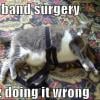Search the Community
Showing results for 'alcohol'.
Found 17,501 results
-
Yeah...think I'd be a bit irked if I heard that from a doctor. So, what, wait a few more years until you do actually have comorbidities and then it'll be okay? I really get tired of people that say "oh you just to diet and exercise more." Sure. Just tell somebody dealing with alcoholism to stay out of bars and all their problems will go away. Well, in the end you're the one having surgery, not him. It's ultimately up to you. Man this burns me up reading this...lol. Put this in your pocket and break it out the next time you need it.
-


Are fat people unattractive and unpoluar?
ted12345 replied to ted12345's topic in LAP-BAND Surgery Forums
<TABLE width="100%" border=0><TBODY><TR><TD colSpan=2>The social and psychological consequences of obesi </TD></TR><TR><TD>Our society has a very negative view of overweight and obesity. Research evidence of stigma and discrimination agrees with the public values and attitudes commonly expressed by the media. They tell us that being fat is an extremely unattractive and undesirable way to be, indeed, that it is a state to be avoided at all costs. This hostility towards fatness has been compared with other common social prejudices, and the striking conclusion drawn that anti-fat attitudes are at the stage that racism was some 50 years ago; namely, that anti-fat attitudes are overt, expressible and widely held. The perception of obesity This derogatory view of obesity is not new. Some of the earliest research, published in the 1960s, examined children’s attitudes, presumably because they openly reflect prevailing adult opinion. In one of these studies 10- and 11-year old children were presented with six line drawings of a child as physically normal and with each of five physical disabilities, one being overweight. Ranking the figures by asking which they liked best resulted in a robust order of preference, with the normal child at the top, and the overweight child at the bottom, below that of a child with facial disfigurement, in leg brace and crutches, or in a wheelchair. In a second study children were asked to assign 39 adjectives to one of three silhouette drawings depicting a thin, a muscular, and a fat body shape. The obese body shape was least frequently assigned ‘best friend’, most frequently ‘gets teased’, and labelled ‘lazy, dirty, stupid, ugly, liar and cheat’ more often than the other body shapes. Subsequent research has confirmed both this order of preference and these perceived negative character traits, broadly describing the obese stereotype as greedy, lazy, of lower intelligence, and socially isolated. It also suggests that the negative response has increased rather than relaxed as might be expected given the increasing levels and public face of obesity. These two studies are important since they describe two principal features of the stigma of overweight. On one hand is the stigmatisation of bodily appearance; obesity is a highly visible but undesirable state. On the other, is the stigmatization of character; the moral view that holds the obese personally responsible for their own state and so blames them for their fatness. Further research with children has extended this characterisation and shows that even pre-adolescents have incorporated the message of poor health, fitness and eating habits in their attributions of overweight. Likewise, there are social class variations in these negative views, with the least favourable attitudes more likely to be expressed by children from higher social class backgrounds. During adolescence overweight may be an important determinant of social experience. Overweight adolescents, for example, receive fewer friendship nominations than lean peers and are less likely to be named as a friend by people they nominate. In addition, teenagers express discomfort with dating overweight peers, something particularly strongly expressed by boys. This confirmation of overweight as unattractive, unhealthy, and least acceptable in affluent social circles goes some way to explaining the high levels of body shape dissatisfactions and dieting in pre-adolescent and teenage girls. </TD><TD> </TD></TR><TR><TD> Download File </TD><TD> </TD></TR><TR><TD colSpan=2>Obesity and psychological health </TD></TR><TR><TD>Given the above catalogue of stigmatisation, a state of poor psychological health would be expected for all obese individuals. However, this is not the case. The variation in psychological adjustment among the obese is broadly comparable to that in the population at large. And there is certainly no major psychiatric disorder or specific personality disorder associated preferentially with obesity. However, there is an emerging literature linking obesity with depression. In one study, for example, over 40,000 adults were given a structured interview including an assessment of anxiety and depression as part of a National Alcohol Survey. Obesity was associated with a 37% increased risk of major depression in women but a 37% decreased risk of depression in men. There was a similar association between obesity, gender and suicide attempts – obese women at increased risk, obese men at decreased risk. Furthermore, although the association between female obesity and depression was rather modest in epidemiological terms, the researchers had controlled for depression co-occurring with physical illness or bereavement. When these were included the association between obesity and past-year depression further strengthened. In another large scale community survey in the US, obesity was significantly associated with past-month depression in women (odds ratio = 1.82) but not in men. Furthermore, there is longitudinal evidence that in people aged over 50, obesity increases the risk of developing depression. The relationship between obesity and self-esteem is not clear-cut either. In adults, obesity is associated with a modest reduction in self-esteem, sometimes limited only to those with morbid obesity. In pre-adolescent children, obesity has little or no impact on global self-esteem. In teenagers, self-perceived overweight is more closely associated with reduced self-esteem than is actual overweight. Similarly, this relationship is stronger in females than in males. Body esteem, or satisfaction with appearance, is the domain of self-worth most affected by obesity. This is especially true for obese adolescents and young women whose sense of identity is greatly dependent on appearance and in whom some show very high levels of body dissatisfaction. Again, body dissatisfaction may be more strongly associated with perceived overweight and depression, than with actual weight. Therapy aimed at improving body image in obese women has shown some success in relieving negative psychological symptoms but has little impact on body weight. Further studies of large representative samples using established measures of health-related quality of life have helped separate physical functioning from psychological health, while showing their inter-dependence. Age is an important moderator of the relationship between obesity and well-being. Overweight and obese women in their late teens and early twenties score significantly lower in physical functioning, vitality and general health, but show few differences on any of the main psychological health measures. The pattern for middle-aged women (45-49) is different. First, there are proportionately more overweight and obese women in this age group. Second, these older obese women score significantly lower than those of average weight on all the physical and psychological health scales. Most of the available evidence shows the greatest deficits are in the severely or morbidly obese (BMI>40). Scores on the psychological health scales for the moderately obese (BMI 30-40) show similarity to those who are underweight (BMI<20), whereas overweight women show similarity to normal weight individuals. It is also important to take account of the co-occurrence of chronic illness. In one study, people with obesity plus other chronic health conditions (around half the obese) reported particularly poor physical and psychological health. Since this was most apparent in those with 3 or more chronic conditions it identifies an especially vulnerable group. It is also notable that among groups of people with similar levels of chronic illness, the additional presence of obesity was associated with a significant deterioration in physical but not emotional well-being. This means that past assessments of psychological well-being may have been confounded by physical health problems. It also shows that obese individuals with pain or co-occurring chronic illnesses are most at risk of psychological distress. </TD><TD> </TD></TR><TR><TD colSpan=2>Binge-eating disorder </TD></TR><TR><TD>Binge eating is one clinical problem that does appear to be more prevalent in the obese, at least in those entering weight loss programmes. The recently described syndrome of ‘binge eating disorder’ (binge eating without purging by vomiting or other means) has been described in 30% of patients attending US weight loss clinics. The use of strict diagnostic criteria reduces this to well below 20%. In community samples, BED is much less common, apparent in only 1-3% of respondents. Overall, the prevalence of BED in any group increases with increasing obesity. Interestingly, up to half describe their binge eating as preceding their obesity, rather than arising as a consequence of extreme dieting, the pattern most commonly found in bulimia nervosa. Attitudes of health professionals Given what has been written above it should be no surprise that the attitudes and beliefs of health professionals reflect those of the wider community. Thus research shows that doctors and medical students are likely to share the moralistic view that obese people are weak-willed, ugly, less competent and likeable, and less likely to benefit from counselling. Bias has also been observed in nurses and nursing students, nutritionists and psychologists. Even health professionals who specialise in obesity show anti-fat biases. They mask overtly negative responses but measures of implicit attitudes reveal the culturally prevalent stereotyping. One important question is whether professionals’ views of overweight have consequences for the medical process. Some time ago it was noted that doctors were more likely to note a weight problem and recommend a treatment programme for women than men. More recently, obese women were found more likely to be misclassified as having coronary heart disease than non-obese women. In addition, the prescribing of lipid lowering medication by British general practitioners has been found less likely in overweight people, with doctors explicitly stating this as their policy. However, the most apparent consequence is the reluctance of obese individuals to seek medical care. This is not restricted to consultations about weight loss but has been observed in decreased use by obese women of preventive health care services such as breast screening. This reluctance could be because obese individuals are aware of the negative attitudes of medical professionals towards people such as themselves. It also may be the result of body self-consciousness, or past experience of health professionals attributing health problems to the obesity. Additionally, doctors may be disinterested in managing overweight patients, in part based on their perceived futility in bringing about weight loss in a group with little presumed will-power. </TD><TD> </TD></TR><TR><TD colSpan=2>The effects of weight change </TD></TR><TR><TD>The effects of weight loss on improving feelings of well-being and self-esteem have been reported many times. This may be especially marked when some form of physical exercise or activity has been part of the weight loss strategy. Indeed, relatively modest reductions in weight can improve general psychological health. However, the mixture of individuals who enter a weight control programme will experience a mixture of psychological repercussions. These will include, pride in their success and a feeling of mastery, annoyance at the difficulties in adjusting their routine to ensure weight loss, despair at apparent failure, and anger and frustration at the effort that has to be expended. Significant and sustained weight loss is not easy for the great majority to achieve. Weight regain is usually associated with loss of psychological gains, although one study at least has shown the psychological benefits of weight loss to remain with full weight regain. The relationship between weight loss and mood is a complicated one and an issue that is not limited to obesity. Of relevance here though is the observation that greater and faster weight losses are associated with poorer mood outcomes. Specifically, nearly half of the studies with a mean weight loss of greater than 9 kg (20 lb) have reported aversive mood consequences. In contrast, there are none in those with smaller weight losses. A related issue is that of weight cycling, or the phenomenon of repeatedly losing and regaining weight, noted as frequent in both overweight and non-overweight individuals. The very few studies that have examined the psychological consequences are consistent in showing that those with a history of weight cycling have significantly more psychological problems, lower levels of satisfaction with life, and more eating disorder symptoms than those who are weight stable. In addition, obese binge eaters have been found to have more past weight cycling episodes than obese non-binge eaters. However, the research cannot yet distinguish whether it is the weight cycling that causes these psychological problems, whether the problems themselves lead to intensified dieting but weight regain, or that weight cycling and psychological problems are correlated but not causally related. Attempts to identify psychological predictors of weight loss have not met with great success. As the preceding account implies, the presence of depression, anxiety or binge eating is associated with poorer weight loss, although again findings are inconsistent. Similarly, summary measures of readiness to change or motivation to lose weight have generally failed to predict outcome. In contrast, self-efficacy – a person’s evaluation of whether s/he can perform the behaviours required for weight loss – is a modest but consistent predictor of success. The need for change Obesity can have devastating psychosocial consequences. However, the mechanisms to impaired psychological health are different from those to physical illness. Two prominent researchers in the field, Stunkard and Sobal make the point very bluntly: ".... obesity does not create a psychological burden. Obesity is a physical state. People create the psychological burden." Changing people's attitudes and thus those of society will not be easy. But the analogy with racism could be used as a starting point for identifying those strategies that have been most successful in the past, and by learning from their outcome. The combination of education, science, good practice, changes in legislation, and a promotion of tolerance, are all necessary to meet this goal. The inclusion of psychological well-being as an obesity treatment goal, the activities of patient support groups, the development of training packages for health professionals, prosecutions for false weight loss product claims by trading standards officers, and test cases for discrimination under employment law would all be steps in the right direction. </TD></TR></TBODY></TABLE> -
I'd honestly ask to go to an endocrinologist or diabetologist at this point since you have such special circumstances with the surgery. Also, keep in mind that sometimes T1 can masquerade as T2. In reality it's really a special subset of T1-adult onset. Has to do with phenotypes I believe. So I would ask if there is any way they could make certain it's T2 and not another variation of it. I've had 2 friends who they found out were actually late onset T1s and not the T2s the docs had initially thought. How much sugar in the protein bar? How many sugar alcohols. There is some proof that many diabetics do not do well with SAs. That they metabolize >50% of the carbs in them as sugar. So you may be sabotaging your bgs with the Special K chips and also the bars/shakes? I know Mr. F. has a terrible spike with Atkins protein bars and doesn't tolerate protein drinks either. I know that's just anecdotal but just wanted to throw that out to you. If it were me, I'd also look up the book Normal Blood Sugars by Dr. Richard K. Bernstein, MD. He's a remarkable dude that pioneered the use of the home glucometer and eating to your meter. His A1c is lower than mine. He's over 70 and has zero diabetic neuropathy. He is a T1 and only take 5 units of slow acting insulin a day if I remember correctly. He's a diabetologist.
-


What did you tell people?!?!?
outwithbenjiboi replied to LeahJade's topic in POST-Operation Weight Loss Surgery Q&A
I don't care one way or the other if anyone tells or not. After hearing about some of the people ya'll work with, I wouldn't want to talk to them either! I guess it just depends on one's personality and circumstances. Circumstances-wise: I have wonderful colleagues at work, and we all support each other with personal challenges. Several of my colleagues are overweight and walk together at lunch; we have a health/fitness directorate at work with a bariatric nutritionist on campus; we have an annual "Portion Off the Pounds" program and everyone in the CLASS shares their eating habits/goals; we have three gyms -- all free. Personality-wise: I was married to an abusive alcoholic for nearly 20 years. On top of that, I was GAY the whole time! With the help of therapy and Al-Anon, I came to see all of the secrets I'd been spinning/holding as TOXIC to me and my growth. So I started a personal policy of 100 percent honesty. Now, I'm very frank and open with everyone with whom I have ANY type of relationship; work, neighbor, family, volunteer, kids' friends, etc. My feeling now is: if they don't get it, I'm willing to invest the time in educating them about alcholism, domestic violence, equal rights, and -- yes -- bariatric surgery! If they're not interested in either learning something new about the world or about me, of if they just can't "stomach" it, fine. But if they are, then I've done some good in the world, expanded my circle of support, and opened someone's mind. All of those benefits are worth whatever risks I face. I am 100 percent me, honest, transparent and accountable 100 percent of the time. It's only made my life better and better and better. No "privacy?" NO PROBLEM! And no, I'm not stupid about cybersecurity/information security. In fact, it's part of my professional industry. BTW, I work for the Department of Defense with military officers from the Joint services and from all over the world, and I'm often the FIRST out gay person they've ever met. I get a lot of appreciation -- and a lot of disclosures from others! -- in response to my visibility. I'm sorry about my "shame" comment earlier. Obviously, that's not the case with everyone (although I'm sure it IS the case with some). But I never again want to live in fear of the risks of sharing ANYTHING about myself that's important to me. If I worked somewhere that imposed that risk, or had relationships with people who imposed that risk -- I wouldn't for long. -


How bad is it that I cheated on liquid pre op diet?
Matt Z replied to Brassapple's topic in PRE-Operation Weight Loss Surgery Q&A
You'll be fine. I cheated a bit on my pre-op. Plus, not all pre-ops are the same. There are lots of generic pre-ops, and those tuned to the patient. Mine was super generic, like, the nurse didn't even bother to check anything other than my BMI before prescribing me my pre-op diet. Just do your absolute best to stick to the diet and make sure those slip ups happen as little as possible. Avoid fats and alcohols and you should be doing just fine. Good Luck! -
S1M1, I think most of us have been in the same situation, with the fear of losing our friend, food. Personally, I didn't think I had a food addiction until after I was banded. Then I KNEW I had a food addiction. Having a food addiction while dieting is like telling an alcoholic they can only have a drink in moderation. That's what we're up against. But the band makes this process SO much easier. So many new bandsters get the idea that the band will do all the work. You HAVE TO WORK! I still have to watch what I eat on a daily basis. The band just makes that whole process so much simpler. I wouldn't trade it for anything.
-


When everyone else is drinking
suzzzzz replied to QueenOfTheTamazons's topic in POST-Operation Weight Loss Surgery Q&A
Nowadays I will usually have a glass of wine in social settings because I want one and enjoy it. If I don't want one, I order Water with extra lime. Prior to being allowed alcohol on my plan, water with lime. Maybe I am old but I don't feel the need to make an excuse for what I am eating or drinking or what I am not. Your non alcoholic mojito sounds good. If at a function or restaurant, a bartender can make many kinds of drinks and leave out the alcohol. -


Not sure what to do... maybe it's a sign
AGreenEyedWolf posted a topic in PRE-Operation Weight Loss Surgery Q&A
This is long... but I really need to get it off my chest and see what you all think. My situation is this: I have a husband with a brain condition, an 8 year old son, and a 25 year old daughter (plus 5 grandsons all under the age of 10). I live in a rural area about an hour from the hospital where my surgery is supposed to happen on Wednesday. I have to check in at the hospital at 6:00 am that day... but my son needs to get on the school bus at 8:15 am that day. We have just one vehicle, and my husband doesn't drive much... but he is going to come with me Wednesday and stick around until I go to the OR... at which point he will come home and get updates by phone until after our son gets off the school bus at 3:00 pm, when he will bring him along and come back to visit me (because by then I should be in a room... kids under 12 are not allowed in pre-op or recovery, so he can't come to the hospital with us). The plan was for my adult daughter to spend the night at our house on Tuesday night and get her brother on the bus Wednesday morning before she goes to work... but she just told me she will be out of town until Wednesday morning sometime and can't do it as planned. I can't take a chance on her not making it in time on Wednesday morning since she has no idea when she will be back in town... my husband and daughter are the only family members who know I'm having surgery, because the only other family member nearby is my mom who will freak out (and as a result stress me out) if I tell her (all I've not told other family members either because they might tell her)... she can't help me anyway... she lives an hour away in the opposite direction of the hospital I'll be at and one of my grandsons lives with her, so she has to be home herself to get him to school that day. Most of the friends I have who would be willing to help me all live too far away to actually help me (as in they pretty much all live in different states), except 2... one has a new baby and another child my son's age, but she lives over an hour away... and the other lives nearby... BUT she hasn't been very supportive of my surgery AND she will want me to send my son to her house for the night instead of coming here for the night... (but my husband won't allow him to stay the night over there because my friend is a victim of domestic violence and he is afraid her alcoholic husband could randomly show up anytime and be violent). So if I even ask, I'm afraid it will put me in an even more stressful position, being stuck in the middle between them. I'm on the verge of saying screw it and cancelling my surgery... I've got no way to make this work that I can see (other than getting a friend to drive me to the hospital and not having any pre-surgery moral support and that's IF my husband would agree to not being there with me and putting our son on the bus himself)... I'm nervous about the surgery anyway... and while I hate to have spent 2 weeks putting out the money and frustration on this pre-op diet, I did lose 10 pounds on it so maybe this is a sign that I just shouldn't do it and can try (again) to lose weight on my own without surgery. I'm so confused and stressed out!! Sent from my SAMSUNG-SM-G900A using the BariatricPal App -
I thought the topic was about alcohol too. I'm 4 mths out and drink a glass of red wine everynite. 100 calories well spent, in my opinion! I started drinking wine at about 2 mths. My dr had no rule pertaining to alcohol except "it's empty calories"
-
Yup, every surgeon is different on this one. Mine said that drinking a bit of Coke when something is stuck will help to unstick it (sometimes it works, sometimes it doesn't, from my experience). Like some of the others, whilst I'm allowed carbonated beverages, they hurt a bit, especially if I have good restriction. My favorite alcoholic beverage when we go out used to be vodka, lime juice and soda Water. The bubbles made it way less enjoyable, so now its vodka, lime juice and still water - much more refreshing and never have a hangover from it lol (not that I drink a whole lot anyway). I will admit to the very occasional half a can of pop though, when I just need a bit of sugar. It's best to talk to your doctor though and see what he or she recommends for you.
-
My doctor cleared me to drink alcohol but not soda, due to the carbonation. Smirnoff is lightly carbonated. Does that mean I shouldn't be having it? I had a few sips and then had the realization. I can literally hear my tummy making sounds because of it. Anyone know if I can have it? Similar experiences? Any knowledge?
-
My doc was extremely lenient in recommending waiting until two months out. I've seen people posting here who were told six months, a year, or NEVER. He also said to try to avoid alcohol. It's not good for weight loss and rotten for your liver, which, if you're very overweight, it probably not in the greatest of shape anyway. I went on vacation at exactly two months and had a couple bottles of white over a couple weeks, and it all went down fine, HOWEVER it took me much longer to recover because I got tipsy a lot faster. Also hydration becomes an issue when you're timing your fluids and working on getting *them* down too. Doc also recommended that if you're going to drink, take an extra ppi a couple hours beforehand to handle stomach irritation. I think basically as soon as your stomach is healed, you CAN do it. But stay hydrated, watch the calories, know your limits, and take an extra ppi. After a couple runins with too much alcohol and not enough Water, I order white wine spritzers with HALF non-carbonated water. Tastes fantastic and minimizes all the other types of damage.
-


Can I eat too little on the Pre-op?
jsm replied to barefootinablacksea's topic in PRE-Operation Weight Loss Surgery Q&A
Here’s something my dietician provided me for the pre-op diet, the basic and alternative if you can’t do all liquid. The Diet: 1. Drink at least 64 ounces of fluids per day (all must be sugar-free, calorie free, and non-carbonated) 2. One multi-Vitamin with essential minerals per day. 3. Consume 1000 - 1200 mg of Calcium per day 4. No Alcoholic beverages 5. Drink 4 - 6 no sugar added Meal Replacement shakes each day (recommends Adkins Advantage even though it has 1 gram of sugar. They taste great and have 15 grams of Protein and 24 essential nutrients plus calcium and no trans fats) Sample Day: Breakfast: 1 shake Lunch: 1 Shake 4pm: 1 Shake (optional) Dinner: 1 Shake Bedtime: 1 Shake (optional) What if you break the liquid fast or just cannot follow a liquid diet for 2 weeks? Plan B - A shake and food meal plan that will keep the fat extremely low. The goal is still to lose as much weight as possible before surgery. The Meal Plan: 2-4 8-11 ounce high Protein Shakes a day 1 meal a day, composed of 3 oz seafood, turkey or chicken (no skin) Or 1 cup Non-fat/low-fat yogurt, cottage cheese or ricotta cheese And Non-starchy vegetables - up to one cup No corn, peas, potatoes, sweet potatoes or baked Beans Fresh Fruit - 1 piece (1 cup) per day Olive oil - 1 tablespoon a day, no salad dressing, no mayonnaise Eat only 1 meal a day. Limited to 20 minutes per meal. Sample Day 1: Breakfast: 1 Shake Lunch: 1 Shake Dinner: Stir-fry 3 oz chicken ? cup broccoli ? cup mushrooms 1 tbsp Mrs. Dash 10-minute Mesquite Marinade 1 tbsp Olive oil Snack: 1 Shake Sample Day 2: Breakfast: 1 cup 2% Cottage Cheese 1 cup fresh peaches 1 cup Lettuce Lunch: 1 Shake Dinner: 1 Shake Snack: 1 Shake Sample Day 3: Breakfast: 1 Shake Lunch: 3 oz shrimp Lettuce 1 cup zucchini 1 tbsp Olive Oil Salsa 1 Pear Dinner: 1 Shake Snack: 1 Shake Hope this gives you some alternatives. Hugs, JoAnne -


Alcoholic drinks after surgery
QuilterGal replied to TeeNahh's topic in Gastric Bypass Surgery Forums
The older I get, the longer it takes me to recover from drinking any amount of alcohol. I always feel like crap the next day. I'm inferring that RNY will just make all of that worse. Not sure it's worth it. -


Whats the earliest you can drink alcohol?
PuraVida37 replied to melanndoll's topic in POST-Operation Weight Loss Surgery Q&A
My doc said NO to alcohol pretty much ever again. I've got no problem with it. I think if in doubt, just don't do it. -


hi, new to the forum. had surgery 4 days ago
Laura1999 posted a topic in Tell Your Weight Loss Surgery Story
Hi. My name is Laura. I had my surgery march 25. So far things are going well. I am feeling good with not much pain. So far including insurance mandated dieting I have lost 21 pounds. I have about 98 more to go. The worst thing is that I seem to be a little bit hungery all the time. I'm sure it didn't help that yesterday I was at a conference with lots of food but I was content with my shake for lunch. The waitress even offered to puree something for me. I have 2 small children 4 years and 18 months who I still have to prepare food for. My husband is very proud of my will power. He is a recovering alcoholic so He can relate to how Hard it can be. For me this lifestyle change is a step in the right direction for my whole family. I would never want my girls to be heavy and I can see my oldest adopting some of my old eating habits. I look forward to meeting people here and hope my experience remains posituve -
Four weeks post op is way to early. Your stomach is still healing. I have had a little white wine since my surgery, but that wasn't until I was 4 months post op. It's really best and safer on your new tummy if you can avoid it altogether. Also, check with your surgeon about the matter, he or she may tell you that alcohol is never allowed. Each doctor is different.
-
My wife gets drunk super fast and can drink as much as her "friends " can pour down her throat . She's now an alcoholic because of the surgery and after losing 160 pounds she's starting to gain weight because of the drinking .
-
I'm just ensuring I only eat at meal times and obviously very small amounts. Plenty of fluids In between and strictly no alcohol !! To be honest I'm never hungry and get full very quickly so my sleeve works very well for me Sent from my iPhone using VST
-
Hello I'm post op 15 years sugar dumping is caused by all kinds of things just because it say no sugar add dosnt mean sugar free. Even sugar free has sugar alcohol witch may cause dumping.
-


Best Med to Break Obsession/Rumination post Sleeve
Anna Nim replied to Anna Nim's topic in Gastric Sleeve Surgery Forums
Thinking Wellbutrin, it is the LEAST likely to cause sexual side effects and weight gain, which those two things are more important than the obsessive. Also, maybe combined with an ADHD medication, to help with energy and focus. Here is an exerpt from: http://www.bipolar-lives.com/benefits-of-wellbutrin.html (Note, I am not bi-polar) We know from clinical studies that Wellbutrin is more than just an effective medication to take if you suffer from bipolar depression. Wellbutrin is as effective as an antidepressant such as Zoloft, Prozac and Paxil, and is more effective than Effexor. Additional Wellbutrin benefits: Helps compulsive gamblers who have other bipolar disorder symptoms Helps smokers kick the habit (under the name of Zyban) Used as a treatment for ADHD Unlike so many other antidepressants, Wellbutrin does NOT induce fatigue Increases alertness and energy It is on the FDA approved list for treating Major Depressive Disorder as well as Seasonal Affective Disorder (SAD) Reminder: Wellbutrin is FDA approved for treating major depression but NOT for bipolar disorder. ... There is evidence that Wellbutrin medicine can help with social anxiety and generalized anxiety. However, it does not help against panic attacks and may even make them worse. (This is why I stopped taking Wellbutrin. For someone who does not have panic problems, Wellbutrin may still be a good option, especially in combination with an anticonvulsant mood stabilizer or with lithium.) Substance abuse? One of the best known benefits of Wellbutrin is how it helps folks quit smoking cigarettes – and marijuana! It may increase sensitivity to alcohol – or it may not – the evidence is inconsistent. Impulsive behavior? Wellbutrin has been shown to be helpful for compulsive gamblers. It should be kept mind though that Wellbutrin is a medicine with stimulant properties and there is not enough data at this time to understand how it may either fuel or control impulsivity. Obesity? Wellbutrin has been trialled as a weight loss aid and is unusual in being an antidepressant that contributes to weight loss rather than weight gain. This is extremely important as people with bipolar disorder suffer from higher than normal rates of obesity and are up to 3 times more likely to die from related diseases such as heart disease and diabetes. -
If you are counting total carbs you need to be under 50 grams total carbs to maintain ketosis. If you are counting net carbs you need to be under 30 grams net carbs to maintain ketosis. They aren't interchangeable. Some believe fiber and sugar alcohols don't impact blood sugar so they can be subtracted and net carbs followed, but that doesn't apply to everyone. I can't eat any of the high fiber "keto" products like breads. For me, carbs are carbs and keto bread will knock me out of ketosis just as fast as a chocolate bar. 🤣 I am not the norm, but it is incredibly annoying!! And I know others like me. Regardless, my dietician said we should count total carbs because net carbs are not a recognized measurement by whatever association decides these things. LOL Most fruit is high in carbs, yes, and so most people watching their carb count choose coconut and berries as opposed to citrus or bananas. Same with veggies, green beans would be a better choice than a sweet potato. Keep in mind this state of ketosis is not intended to last forever, so what might not be the best item to eat right now will fit perfectly later on in your nutritional picture when you can increase your carb count.
-


What problems or issues contributed to you being overweight?
Jachut replied to ItalianSoul's topic in LAP-BAND Surgery Forums
Maybe I'm kidding myself, but I dont think so. I just dont really have "issues". Oh, I tend to eat inappropriately, boredom being a main factor and I love those sweet carbs. But what person DOESNT have some bad eating habits? I truly believe I was fat because I simply cannot eat as much as the next person without gaining weight. I *only* moderately obese at a BMI of 35 as I simply never did the sort of eating that would take me further. I ate basically healthy foods, with too many extras, simply because it was an enjoyable thing to do when I went out, when I went to the shops, when I was with friends. What I ate made me fat, but it didnt make many of my friends fat. The higher alcohol intake you tend to have when you're young and and at uni and first working made me fat, it didnt make others fat. I gained appropriate weight in pregnancy and lost it so i cant blame that, but after the babies were born and I spent long hours at home, I ate more Snacks and did less exercise, so I gained a bit. I also believe that breastfeeding (which I did for six years in total) caused me to gain a fair bit, it never worked as a weight loss tool for me. That's all there is to it, I simply needed to eat less. I really havent had to change a long with the band, I just eat less than I did but basically in the same way. I had no trouble adjusting to that. I have managed to break a few bad habits and increase my exercise. I'm very lucky really. There simply has been nothing to really deal with. I have a childhood, adolescence and early adulthood as being "heavy" but not obese, and I tended to diet a lot to try to get skinnier, and I think that was detrimental as well but I dont really have self esteem issues, bad memories of my youth, traumatic experiences related to my weight other than just not feeling attractive. -


Managing VSG while traveling every week for work -- tips please
zoekids posted a topic in POST-Operation Weight Loss Surgery Q&A
Hi, I am a little over a week away from flying to MX for my surgery. I travel for work every week. It is about an hour flight, each way. I keep my main bag at the hotel. It has all of my main work clothes, toiletries, makeup, etc. Thus, I won't have a heavy bag to lift or carry. I just take "undies" back and forth and my laptop. I have a small bullet like blender at the work site. I currently go to whole foods every week and buy food for the week for lunch and dinner. Thus, I am used to not eating for the most part at restaurants. But, I do have semi-required dinners when the hot shots come to town or we are celebrating a milestone. In fact, we have one the first week I am back from surgery. I think I am going to try and skip this first one, but I can't do that every time. I have purchased the Dr's recommended Vitamins and Protein powder. I have a set in my desk and a set at my apartment. I purchased broth for both locations. I have told my immediate team that I am getting this surgery. In fact one of my team mates did the Y thing about a year ago. She lives closer to the work site and drove back and forth every week. She also convinced them to let her stay at an apartment. I really don't want to stay at an apartment as I don't want another place to clean. (call me lazy). Anyhow, my immediate colleagues know I will be eating weird and can't drink alcohol. But, the larger team doesn't know that I know of. I am sure they will find out eventually. Also, there are three of us that have gone together and we have a personal trainer that comes to the hotel twice a week. I told him about the surgery. I told him I probably couldn't do anything my first week back except walk. I am hoping that the next week I can start doing his workouts, but just making sure i am not lifting ... yes, I will talk to the Dr. in MX to find out more details. Any experiences with that would be helpful. What else can I do to make this VSG lifestyle work for me. Any and all tips are welcome. Mary -
I can say from almost a year and half of being banded and 90 lbs lost that drinking alcohol has not held me back. But again your experience may be different and you need to tell your Dr. The reason I got the lapband was to make some positive lifestyle changes but I also enjoy going out with my friends, having a couple drinks or shots. I got the band so I could live the life I wanted to and that does include some alcohol. Plus they did a study in britian that found that women who drink 3 to 4 a week are actually healthier than those who don't. It was a 20 year study. Again you should have this conversation with your surgeon.















